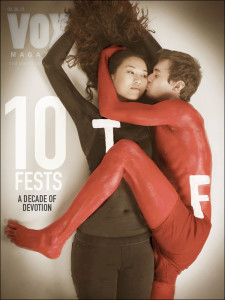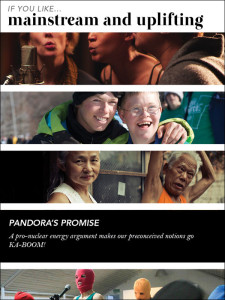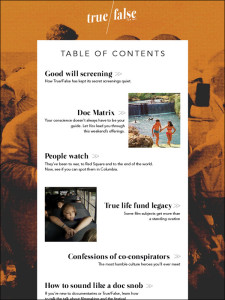How Vox Magazine Prepares For and Covers the True/False Film Fest
It Takes a Lot of Missouri Journalism Student Power to Write about One of Columbia’s Biggest Events
By Celia Darrough
Columbia, Mo. (May 6, 2013) — In what was probably the biggest event coverage of the year for Vox Magazine, there was so much happening in print and online that it took 17 color-coded Google docs shared with everyone involved to keep track of who was doing what, when and where.

Vox, the award-winning weekly arts and entertainment magazine produced by students at the Missouri School of Journalism, enlisted seven classes and somewhere around 80 students – who can count? – to help in covering Columbia’s 10th annual True/False Film Fest.
True/False is a four-day long movie festival in late February/early March that began in 2003. It now hosts more than 35,000 film fanatics who come to mid-Missouri to meet directors and watch documentaries that are often also screened at Sundance, one of the largest film festivals in the United States.
It takes more than a few people to cover an event of this magnitude. On a regular basis, Vox staff members plan feature stories three to four weeks in advance, and writers have three days to turn in a first draft before it goes through an editing process where it is seen by at least two faculty members and one student editor. Stories are posted on Facebook and tweeted about, and there are almost always photos and videos to accompany content. Students also produce content for the daily blog, VoxTalk.
Contributors also write movie, book and concert reviews, so the content wasn’t new to Vox, but the scale of coverage was much larger than usual.
For this issue, magazine journalism faculty members met in the beginning of the semester to start planning coverage. After meeting several times and making basic plans, individual professors went to their students to coordinate. The students in the Advanced Writing class taught by Assistant Professor Amanda Hinnant wrote the stories for the feature well of the 24-page print edition. Hinnant has been a key member of the True/False print issue for several years.
Assistant Professor Sara Shipley Hiles told senior Laura Heck, the Vox blog editor who works on planning and executing online content, that she wanted to cover everything. Everything.
Vox Magazine’s True/False Coverage by the Numbers
- Number of tweets: 118
- Number of blog posts: 112
- Number of Instagrams posted: 29
- Number of movie reviews: 34
- Number of panel reviews: 8
- Number of concert recaps: 6
- Number of event recaps: 16
- Number of Facebook posts: 14
- Number of photos: 450+
There were 36 films, 39 bands that played either as pre-movie entertainment or at a special concert, eight panels where directors give insight to the film process and other events such as the True Life Run, a 5K that benefits True/False’s film philanthropy, and the March March Parade, a kick-off event where participants dress in colorful costumes and spectators listen to live music and view decorated floats.
Hiles told Heck they had so many students, so many days, and so many events to cover. She asked Heck to propose a coverage schedule based on that information.
“Teaching assistants have a high level of leadership and independent work,” Hiles said. “Faculty are there to assist, but they did a tremendous job coming up with unique ideas.”
Heck had covered True/False the year before, so she was familiar with the festival. She went to the Vox office in Lee Hills Hall armed with giant poster sheets and a pack of colored markers.
She spread the posters over a few tables in the office, printed out the True/False event schedule, the film schedule and the panel schedule and started drawing it out.
Heck said she thought about when she would need people to be at an event and how many students she would need. To do this, she color-coded each type of person. Reporters were yellow, live bloggers were purple, music reporters were blue, photographers were pink, multimedia reporters were orange, and street team members were green.
“I just kind of started fitting all the pieces together and making sure we had everything,” Heck said. “Basically it was just trying to think of every single aspect of True/False that we wanted to cover.”
Heck and many other students were involved in the planning process. As the weekend began, the students took to the streets to cover the event.
With coverage that consisted of 112 blog posts, 34 film reviews, 16 event recaps and hundreds of posts on social media, students wrote about most events at True/False except for secret screenings, which are embargoed. Stories had to be turned within hours or even minutes depending on the circumstance, Hiles said.

Students prepared for the intense coverage through numerous class meetings and instructions, Hiles said. Plus, students who are in the Magazine Staff and Magazines Across Platforms courses are required to blog at least once weekly for VoxTalk.
Alex Etheridge was the Vox editor who coordinated the review coverage with students from the Critical Reviewing class taught by Assistant Professor Andrea Heiss. She and three other department editors worked shifts throughout the weekend to edit and post all the film reviews.
Blogging was one of the bigger efforts. Writers were scheduled for four-hour shifts, some of which started at 9 a.m. and some that ended at midnight. Live bloggers would walk around the festival and choose something they thought was interesting to write about.
For the blog, students interviewed festival attendees and created popular posts such as “What was your highest Q number?” (Answer: 274). When someone who wants to see a movie at the festival does not have tickets, a “Q” number is assigned to them so they can walk around the festival until the film starts without waiting in a physical line.
Though other department editors at Vox edited the music and film reviews, Heck and the assistant blog editors were the ones who coordinated content and posted online, so everything ended up filtering through them. They were in the office well after midnight each night.
“We just really decided to go all out this semester,” Hiles said. “We felt it’s increasingly important to be able to cover a community event like this, and it is perfectly suited to our content.”

Aside from the traditional print form, the magazine created an interactive experience on the website and in a special iPad issue. Students also took video, tweeted and posted photos to Instagram.
One new feature this year was a street team that handed out Vox’s True/False edition. All stories in the 24-page issue were dedicated to the film festival. Students roamed around town giving issues to anyone they saw. The team was so well staffed that one student, unaware what editorial director and magazine journalism faculty chair Jennifer Rowe looked like, handed her a copy.
Hiles went to the March March parade and said she could tell that everything she had prepared for was going to go well.
“Everybody had this tremendous feeling of a team enterprise,” Hiles said. “I felt that we were everywhere blanketing the festival, and it was so fun to see the students working as a team. We were on top of it.”
Heck agreed. She saw eight films and was in the office so much that she barely slept. It was crazy, she said, but it was worth it.
“I’m really glad that Vox had such a presence at the fest, because it is so important to Columbia, and we were really happy to have been a part of it,” Heck said.
Classes involved included Magazine Staff, Magazine Across Platforms, Advanced Writing, Critical Reviewing, Advanced Magazine Design, Convergence Reporting and Vox members in News Reporting.
Updated: July 16, 2020